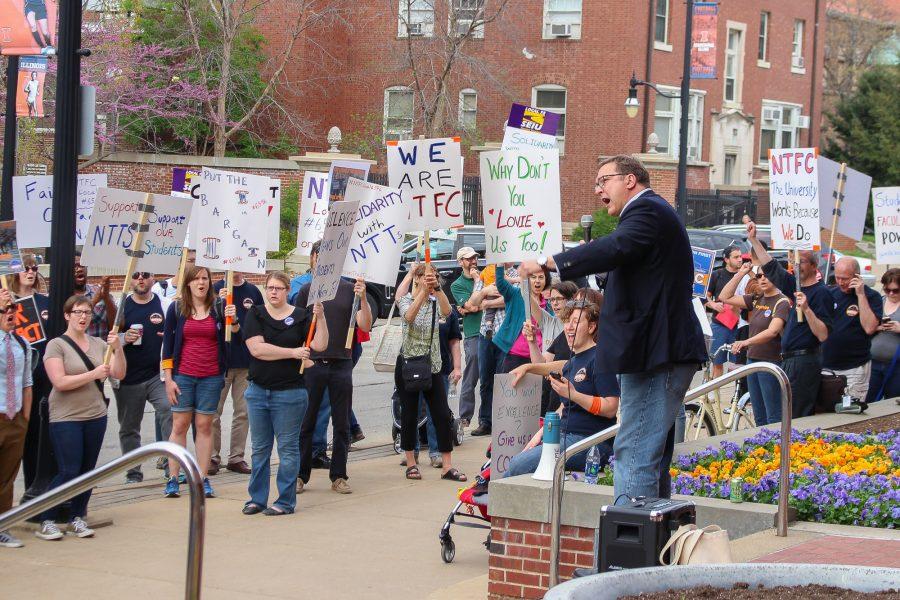UI to continue paying employees despite no federal requirement
Non-Tenure Faculty Coalition holds a rally in front of the Swanlund Administration Building on Tuesday, April 19. Daniel J Montgomery, president of the Illinois Federation of Teachers, speaks in front of the crowd.
Dec 8, 2016
The University will continue with promised pay raises despite a federal injunction of the Fair Labor Standards Act.
The rule would have increased the threshold for overtime eligibility from $23,660 annually to $47,476 annually. The University planned to increase some employees’ salaries to meet the new threshold and avoid paying overtime.
The court injunction came just days before implementation was set to begin, and the University halted its plans. Administrators consulted with legal counsel, reviewed how peer institutions were responding and considered how the University had already promised raises to employees, according to Deb Stone, director of academic human resources.
“Many employees had already received their notification of appointment from the Board (of Trustees), so those were all factors in leading us, with support from the president and others, to proceed with the raises that had already been committed,” Stone said.
Employees raised concerns about the University rescinding the pay increases at a Council of Academic Professionals meeting last Thursday.
Get The Daily Illini in your inbox!
Katharine Schleich, a wetland geologist specialist with the state geological survey, said she received communication her raise was supposed to go into effect Nov. 16. She worried the University cancelling the increase would essentially breach her contract and is pleased it continued with the planned raises.
“I think it wouldn’t have looked favorably on the University if it would’ve gone back on the notices of appointment. And I don’t think that sets good precedent in trusting the University,” she said.
Steve Sligar, director of the school of molecular and cellular biology, said the raises could create rifts between employees in laboratories since new post-doctoral research associates, or post-docs, could make near the same amount or more money than employees who have worked at the University for years or even decades.
“I think you’re seeing a situation where the HR people have interceded into the management of the laboratory and tweaked this one end — and we’re not saying the people who are post docs don’t deserve the higher rate — but they’re not addressing the other inequities, so they’re causing a lot of strife in the management of the research enterprise,” he said.
The increases are estimated to cost more than $3 million, but funding for post-docs comes from multiple state and federal sources, according to University spokeswoman Robin Kaler.
Professors typically receive fixed amounts of grant money to run their labs and pay their employees’, including post-docs’, salaries. The raises will absorb more of that dollar amount, which could reduce the amount of research performed.
“Grant money is a zero sum game,” Sligar said. “In other words, you can’t just go and get more money from (National Institutes of Health), (National Science Foundation) or whoever’s funding you. It’s basically you have this money to do this amount of science.”
About 600 people at the University would have become newly eligible for overtime under the Fair Labor Standards Act; they received timesheets two days before the injunction was announced. The University will pay any overtime those employees worked that week, but they will no longer be eligible.
“The injunction says the current rules are in place,” Stone said. “So they currently don’t meet the criteria to be eligible for overtime under the law.”
The current rules could change, depending how the court rules.






